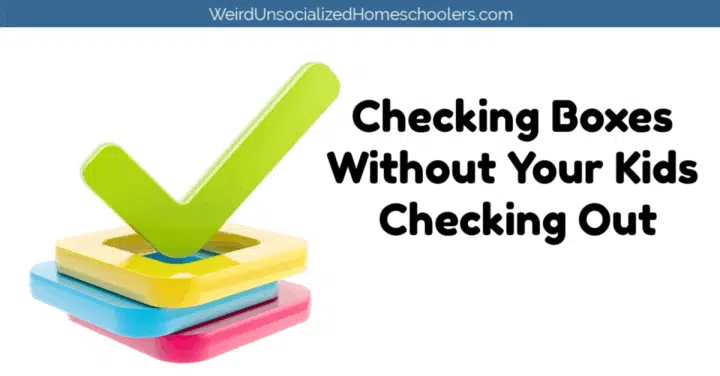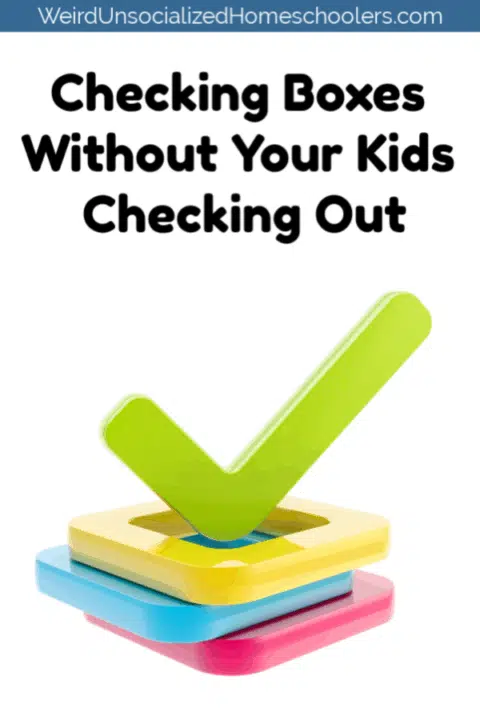Checking Boxes Without Your Kids Checking Out
What do you do when homeschool laws force you to teach boring subjects? Get tips for checking boxes without your kids checking out mentally.
One of the biggest homeschooling pros is the fact that we can teach what we want how we want to teach it.
Usually.
Depending on where you homeschool, your state may dictate some of what you have to include in your homeschool. And, if you have a college-bound teen, admissions requirements may play a role in course planning.

So, what happens when you have to teach something that is less-than-appealing to your student? How do you satisfy state regulations or college expectations without boring your kids?
I’ve got some tips for checking boxes without your kid checking out.
Capitalize on Your Student’s Interests
When the requirements aren’t specific, capitalize on your student’s interests. Let’s say, for example, that your state requires three high school science credits. Just because biology, chemistry, and physics are typical courses doesn’t mean that’s what you have to teach in your homeschool. Consider alternatives such as marine biology, zoology, astronomy, meteorology, forensics, earth science, or geology.
Maybe your state requires two social studies credits. Often U.S. history is needed, but the other credit doesn’t have to be world history. Perhaps your student would be more interested in European or British history, geography, or World Wars. Sometimes a course like psychology will satisfy the social studies requirement.
Seek Creative Ways to Satisfy Requirements
States or colleges may mandate what you have to teach in your homeschool, but not how you teach it. Look for creative, textbook-free solutions for teaching or supplementing. Try:
- Videos – Documentaries, self-paced courses, streaming services, and sites such as YouTube and Khan Academy are good choices.
- Podcasts
- Online courses
- Community or continuing education classes
- Field trips
- Local clubs and organizations such as Toastmasters
- Volunteer and internships opportunities
You might also keep an eye out at local colleges or libraries for lectures and events that are open to the public.
Add Friends
When the kids did Apologia’s Constitutional Literacy course, we were afraid it might be kind of, well, boring. (It wasn’t!) I theorized that a boring class would be a lot more fun with friends. So, we started a mini-co-op with Josh’s and Megan’s BFFs.
Even though it turned out that the course wasn’t boring at all, it was a lot more fun with friends. And, we all looked forward to our weekly Friday gathering.
Consider meeting weekly (or more often) with a group of friends for science labs, foreign language, or history projects. You might even want to let your student practice a new language daily with a friend over Skype or FaceTime.

Take Advantage of the Way Your Student Learns
Think about the ways your child prefers to take in new information and work with that as much as possible. Curriculum vendors such as Apologia offer packages with a textbook, student notebook, audio CD, and DVD. So many options make it easy to teach your student whether he prefers an auditory, kinesthetic, visual, or hands-on approach to learning.
An auditory learner may prefer to listen to a CD while doing a quiet activity like drawing, knitting, or building with LEGOs. My oldest carries her knitting everywhere – even to movies. While I would find that distracting, she pays attention better when she keeps her hands occupied.
A visual learner may find it helpful to highlight, color-code, or illustrate text as she reads. Those doodles in the textbook that drive you batty might be the key to understanding for your student.
Don’t be afraid to tweak homeschool curriculum to make it work better for your family.
Let’s face it – some courses are probably going to be boring no matter what you do. But, most of the time, with a little creativity, we can find more engaging, thought-provoking ways to cover the information our kids need to know.
You Might Also Like
Kris Bales is a newly-retired homeschool mom and the quirky, Christ-following, painfully honest founder (and former owner) of Weird, Unsocialized Homeschoolers. She has a pretty serious addiction to sweet tea and Words with Friends. Kris and her husband of over 30 years are parents to three amazing homeschool grads. They share their home with three dogs, two cats, a ball python, a bearded dragon, and seven birds.






Hi Kris, I want to thank you for this post (Checking Boxes Without Your Kids Checking Out), it has given me much to think about.
My two oldest kids, ages 14 & 16, have unschooled up until last summer. At that point, the 16yo decided he needed “a real education” because he wanted a “real diploma” so he could get a “real job” in the “real world.” I was godsmacked. He, the hyper, can’t sit still very long, has to move to concentrate, hands on life learner who Loathes writing and has scorned “schoolwork” as stupid and pointless suddenly did a 180.
After the shock wore off, and he continued to hold to this new approach as being what he wanted, I agreed. I thought-“Well if this is what he wants, let’s find a new path for him. Perhaps he has finally hit that Scholar Phase that I hear about in TJEd circles.” His younger sister, who is more inclined to do book work thought it looked great too & pleaded with me to let her do it to. Because after all, she “doesn’t do anything & isn’t learning anything and doesn’t want to be stupid all her life.” (Her direct words!) ugh.
So, after researching and praying, we decided to go with an “Accredited High School Program” that uses PACEs. Small workbooks that teach to test and then you pick up the next work book.
It got old quick. And he began cheating. And he keeps cheating when I’m not directly supervising him. And his dad is fine with that because he “cheated in high school & the work is dumb anyway.”
Yup. He said that. In front of our son.
I’m quite hurt, angry & confused.
Hurt because I believe I fail to cast the vision for our home education & failed to validate how & what the kids have been learning.
Angry because of how my husband handled this (and other situations)
Confused because I do have know if we should abandon the PACEs program & start a new course or go back to the old course.
Reading this post has given me food for thought. If nothing else, it is encouragement for how to keep going with my 12yo. Who btw has no interest in doing what her siblings have chosen; much to my relief!
Thank you again for this post and for your blog. It has helped, encouraged & inspired me.